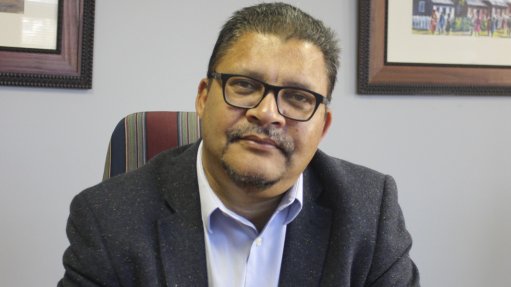
CHRIS CAMPBELL Stakeholders must remain hopeful that the mining industry can be resuscitated
There have been positive developments in local mining, such as the significant improvement in the relationship between government and industry stakeholders, says industry body Consulting Engineers South Africa (Cesa) CEO Chris Campbell, but he adds that industry, however, may not see immediate results.
The improvement in the relationship between government and the mining industry can be attributed to the appointment of Gwede Mantashe as Mineral Resources Minister, who engages with the industry, as well as the publication of Mining Charter III after the impasse which existed, he says.
Mining Weekly reported last month that stability and policy and regulatory certainty, as well as the rebuilding of trust, had been the key themes in Mantashe’s first year in office. He also started to rebuild relationships with business, labour and communities in the vicinity of mining operations. Mantashe has noted that there was an improvement in the level of engagement between the social partners, compared with that of a year ago, but that there is still room for improvement.
Minerals Council South Africa has stated that, over the past year, extensive discussions had taken place between the Department of Mineral Resources and sector-specific leadership forums about the challenges that each sector faced, and how to find solutions that would ensure the long-term sustainability, growth and transformation of the industry, Mining Weekly previously reported.
Although the publication of the charter is a step towards creating regulatory and policy certainty, with a renewed expectation that “investment will be reignited”, Campbell tells Mining Weekly that political uncertainty still hampers the country.
He suggests that improvement and increased investment in the mining industry may be observed only after the general elections next month.
Nevertheless, key to the industry’s growth is investor confidence and the stimulation of the local market, as it will be difficult to encourage foreign investment if local investors do not have sufficient confidence in the industry.
“We have to bear in mind that the mining industry is vibrant only when there is large-scale foreign investment, which is not currently the case.”
Campbell adds that mining has always been the pillar of the South African economy and that it is a matter of getting back to a level of overall political certainty, after which investment appetite will pick up.
South Africa’s mining production edged up 0.5% year-on-year in October 2018 – contributing R447-billion to the economy, Mining Weekly reported last month. The sector contributes about 7% to gross domestic product and accounts for about 40% of the country’s foreign earnings.
Nevertheless, stagnation of the mining industry has resulted in fewer opportunities for consulting engineers who are directly involved in the design and construction of mine processes and even fewer for consulting engineers who specialise in the design of supporting infrastructure that would be required for a new mine, as well as spin-off developments.
Campbell points out that many consulting companies that have longstanding relationships with mining companies are involved in projects outside South Africa. Some are involved in maintenance projects locally and possibly smaller projects on existing mines.
“However, we are optimistic that the mining industry will improve over the next few years simply because mining has always been the largest driver of our economy,” he suggests.
He explains that the country has other sectors driving economic growth, “but to lose the impact of a vibrant mining industry in such a short time has had a major impact on our economy”.
Campbell emphasises that stakeholders must remain hopeful that the mining industry can be resuscitated, and then the growth of other industries must be catalysed.
He reiterates that Cesa is optimistic that “the impossible can be made possible . . . which simply requires that government and industry re-establish mutual trust and forge the kind of partnership that makes for a prosperous and growing economy. The rest of the benefits will follow”.